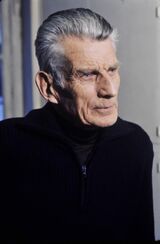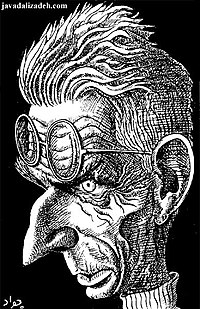
1977 photograph of Samuel Beckett.
Samuel Barclay Beckett (April 13, 1906 - December 22, 1989) was an Irish writer who spent most of his adult life in France and wrote in both English and French. His works include non-fiction essays, poetry, short stories, novels, stage plays, the screenplay for one movie which was filmed twice and scripts for television and radio dramas. He is best known for the stage play Waiting for Godot, which was first performed in French in 1953 and in English in 1955.
Apart from some French-language poems, written late in Beckett's life that remained untranslated into English at the time of his death, Beckett translated all of his own works into his other language. He translated into French the works that he originally wrote in English and translated into English the works that he originally wrote in French himself.
Beckett won the Nobel Prize in Literature in 1969.
Biography[]
Samuel Beckett was born into a Protestant church of Ireland family in Dublin on April 13, 1906. His parents, civil engineer William Frank Beckett and nurse May Barclay, had married five years earlier. Beckett had one older brother, Frank Edward Beckett, who was born in 1902. In 1919, Beckett went to Portora Royal School in County Fermanagh, the same boarding school which Oscar Wilde had attended some five decades earlier. Beckett was a keen sportsman and played cricket for Dublin University. As a result of a first class game which his team played against Northamptonshire County Cricket Club, Beckett is the only Nobel Prize winner to have an entry in Wisden Cricketers' Almanack.
Between 1923 and 1927, Beckett studied English, French and Italian at Trinity College, Dublin. After graduation, Beckett briefly taught at a boys' boarding school in Belfast before taking up a position as an assistant English teacher at a prestigious Parisian university. In Paris, Beckett met James Joyce and worked for the writer as a researcher. Beckett's first published work was a 1929 essay in defense of Joyce's writings. His first short story "Assumption" was published the same year and his first poem "Whoroscope" was published in 1930.
Beckett took up a teaching position at Trinity College, Dublin in 1931 but soon found that he disliked academic life and left. He began work on a novel Dream of Fair to Middling Women but abandoned it. He completed his first novel Murphy in 1936. Beckett traveled across Germany in 1936, keeping a journal in which he expressed his dislike of the Nazi regime.
In 1938, Beckett settled permanently in France. He began a relationship with Suzanne Dechevaux-Dumesnil, initially his tennis partner and later his lover and lifelong companion. The two married in London in 1961.

1961 portrait on wood panel of Samuel Beckett by Reginald Gray.
After France was occupied by Nazi Germany in 1940, Beckett joined the French Resistance. When his unit was betrayed in 1942, Beckett moved to the village of Roussillon in the south of France and continued to help the Resistance by storing weapons in his backyard. Although Beckett later referred to his wartime activity as "boy scout stuff", he was decorated for it by the French government.
In 1945, Beckett decided that in order to be a successful writer he would have to move away from imitating the clever style of James Joyce and that his writings should focus on stupidity and ignorance. He began to write primarily in French because he found that it helped him to write simplistically. One of Beckett's earliest works in French was the play Waiting for Godot, the success of which in Paris in 1953 and in London in 1955 opened up a career for Beckett in the theater, as both a playwright and a stage director.
The BBC approached Beckett in 1956, requesting him to write a radio play. All That Fall was the first of seven plays which Beckett wrote for radio. Eh Joe (1965) was the first of seven dramas which Beckett wrote for television. Beckett's screenplay Film was filmed twice, in 1964 in New York with the protagonist played by former silent movie comedy star Buster Keaton and in 1979 in London, without Beckett's involvement, with the protagonist played by veteran British comedian Max Wall.
Beckett won the Nobel Prize in Literature in 1969 and gave all the prize money away. In spite of having a reputation for being a very private person, Beckett happily answered letters about his works and his writing process and occasionally gave interviews to people who sought him out in the lobby of a hotel near his home in Paris.
Samuel Beckett died on December 22, 1989, five months after his wife Suzanne. The two are buried together in the Montparnasse cemetery under a simple granite gravestone.
Partial list of works[]

Caricature of Samuel Beckett by the Iranian artist Javad Alizadeh.
Plays[]
- Eleutheria (1940s, published after Beckett's death in 1995)
- Waiting for Godot (1953)
- Act Without Words I (1956)
- Act Without Words II (1956)
- Endgame (1957)
- Krapp's Last Tape (1958)
- Rough for Theatre I (late 1950s)
- Rough for Theatre II (late 1950s)
- Happy Days (1961)
- Play (1963)
- Come and Go (1965)
- breath (1969)
- Not I (1972)
- That Time (1975)
- Footfalls (1975)
- Neither (1977)
- A Piece of Monologue (1980)
- Rockaby (1981)
- Ohio Impromptu (1981)
- Catastrophe (1982)
- What Where (1983)
Novels[]
- Dream of Fair to Middling Women (1932, published after Beckett's death in 1992)
- Murphy (1938)
- Watt (1945, published 1953)
- Mercier and Camier (1946, published 1974)
- Molloy (1951)
- Mallone Dies (1951)
- The Unnamable (1953)
- How It is (1961)
External links[]
- Biography of Samuel Beckett on the official Nobel Prize website.
- Quotations from Samuel Beckett in English and French on Wikiquote.
